- Home
- Joseph Bruchac
Flying with the Eagle, Racing the Great Bear
Flying with the Eagle, Racing the Great Bear Read online
Copyright © 1993, 2011 Joseph Bruchac
Originally published in 1993 by BridgeWater Books, an imprint of Troll Associates, Inc.
All rights reserved. No part of this book may be reproduced, stored in a retrieval system, or transmitted in any form or by any means, electronic, mechanical, photocopying, recording, or otherwise, without written permission from the publisher.
Library of Congress Cataloging-in-Publication Data
Bruchac, Joseph, 1942-
Flying with the eagle, racing the Great Bear : tales from native North
America / told by Joseph Bruchac.
p. cm.
Originally published: Mahwah, N.J. : BridgeWater Books, c1993.
Includes bibliographical references.
ISBN 978-1-55591-693-0 (pbk.)
1. Indians of North America--Folklore. 2. Indians of North
America--Rites and ceremonies. 3. Masculinity--Folklore. 4.
Tales--North America. I. Title.
E98.F6B893 2009
398.2089’97--dc22
2009048182
Printed on recycled paper in the United States of America by Malloy, Inc.
0 9 8 7 6 5 4 3 2 1
Design by Jack Lenzo
Cover image © Naturalvisions | Dreamstime.com
Eagle © Johan63 | Dreamstime.com
Fulcrum Publishing
4690 Table Mountain Drive, Suite 100
Golden, Colorado 80403
800-992-2908 • 303-277-1623
www.fulcrumbooks.com
For all of our sons—J. B.
Contents
Introduction
The Northeast
The Dream Fast, Anishinabe
White Weasel, Abenaki
Racing the Great Bear, Iroquois
Granny Squannit and the Bad Young Man, Wampanoag
The Southeast
How the Game Animals Were Set Free, Cherokee
The Wild Boy, Caddo
The Underwater Lodge, Muskogee (Creek)
The Wisdom of the Willow Tree, Osage
The Southwest
The Owl-Man Giant and the Monster Elk, Apache
How the Hero Twins Found Their Father, Diné (Navajo)
The Bear Boy, Pueblo
The Ghost Society, Yuki
The Northwest
The Light-Haired Boy, Lakota
Star Boy, Cheyenne
Salmon Boy, Tlingit
Tommy’s Whale, Inupiaq
Afterword
About the Author
Introduction
There comes a time in every boy’s life when he must step into manhood, a time when a boy must leave his home, leave the protection of his mother and father, and go out to prove to himself that he can survive and grow. That fact seems to have been recognized by every human culture. Clearly defined rituals, or rites of passage, were developed to help the young man make that change and better understand the responsibilities of his new adult roles.
Among the more than four hundred different tribal nations that existed in North America before the coming of the Europeans, there were many different rites of passage for young men. The many varieties of the sweat lodge, the practices of fasting in isolation and praying for a guiding vision, and the deeply symbolic ceremonies in which the older men took on the guise of ancestral beings and powerful spirits are among the better-known rites of passage practiced by many Native nations.
One powerful way in which the meanings of this transition have been taught for thousands of years is through traditional stories. Two decades ago, when I first began telling the traditional stories that were part of my own Native heritage, it was to share them with my own children. They were small boys then, but as they grew and changed, my understanding of how the stories worked grew with them.
Many of the stories I’ve been given are tales designed not only to help the boy find his way to full manhood, but also to help the man remember the boy within himself, so that he can be sympathetic and helpful to the coming generations. The old tales grow with us. Now my sons, Jim and Jesse, are young men, telling the stories they learned to the children they teach. That is how the circle of stories works, linking the generations.
Like all the Native American stories I know, the ones in this book are designed both to entertain and to educate. I offer them as a few examples of the ways in which the many different tribal nations of North America recognized the need to guide and gently channel young men as they grew.
I have divided the book into four sections because four is a number of powerful and magical importance to Native peoples: There are four seasons, four winds, four directions, four stages in a person’s life. It is interesting in these tales how often each young man faces trials in clusters of four.
One of the reasons I have devoted so much of my own life to the understanding and the respectful telling of traditional Native stories is my strong belief that now, more than ever, these tales have much to teach us—whether we are of Native ancestry or not. We learn about ourselves by understanding others. Our own traditions can be made stronger only when we pay attention to and respect the traditions of people who are different from ourselves. Hearing or reading the stories of the Native peoples of North America will not make any of us Native Americans, but it may help make all of us more human.
The Northeast
One of the most common rites of passage found throughout most of Native North America is the vision quest. It is known among the Lakota of the western plains as hanblecheyapi, which translates into English as “crying for a vision.”
This practice, however, is not limited to the Native American people of the West. As we see in the Anishinabe story “The Dream Fast,” it is also present among the peoples of the northeastern woodlands. Many Native people still believe that special guidance is available from the forces of nature and that by fasting and praying in an isolated place, the spiritual senses are sharpened. Animals may come and offer themselves as guides, and a boy may, indeed, find himself flying with the eagle—as we see later on in the book.
The experience a boy has on his first vision quest often shapes the rest of his life. There are many different ways of seeking a vision, but most of them involved going to a place removed from other human beings and remaining there without food for as long as several days.
The ordeal is also a part of the experience. Going out without the protection of parents, symbolically orphaned as in the story of “White Weasel,” is a common theme in these tales. When a boy does this, he may encounter dangerous, even malevolent, forces. The stories tell us he may overcome adversity by making use of the good teachings given to him by his elders.
Such recurring themes mirror or sharpen the experiences expected in “real life.” Sooner or later, each of us must be like Swift Runner in the Iroquois story “Racing the Great Bear” and challenge our own monsters, with our survival in the balance. These stories tell us that if we have listened well to our elders, we can rely upon ourselves when the need arises.
Finally, “Granny Squannit and the Bad Young Man” remains one of my favorite tales in this section. It is not only a rite-of-passage story, but also a good example of the way Native children are disciplined. Beating children or even shouting loudly at them is avoided by Native American parents. Instead, telling lesson stories and speaking calmly and clearly to children to try to lead them in the right direction are common practices. As a las
t resort, a parent might threaten an unruly child with monsters that prey only upon disobedient children.
Native youngsters are encouraged to refer to elders, whether they are human, animal, or a force of nature, as “Grandmother” or “Grandfather.” As a combination of elder and fearful being, Granny Squannit is called upon to help teach a particularly bad boy the proper way to behave.
The Dream Fast
Anishinabe
Long ago, as it still is today, it was the custom for a boy who reached a certain age to go into the forest and wait for a dream. He would build a small lodge and go without food for many days, in the hope he would be visited by some animal or spirit of the forest that would take pity on him and give guidance and power.
There was a boy named Opichi who reached that age. Opichi’s father was very respected in the village, and he was determined that his son would be given a dream of such power that no one else could compare with him. So eager was the father for his son to get power that he insisted the boy go on his dream fast before the last snow left the ground, even though most boys would wait until the time when the ground was warm and the leaves returned to the trees.
“My son is strong,” said the father. “He will go now. He will gain greater strength from the cold.”
Opichi was a boy who always wished to please his parents, and so he did as his father said. They went together into the forest, and the father selected a spot on top of a small hill. There Opichi made a small lean-to of saplings, covering it with hemlock boughs. He sat beneath it on the bare ground with a thin piece of deerskin wrapped about his shoulders.
“I will return each day at dawn,” the father said. “You will tell me then what you have seen.”
That night the north wind, the icy breath of the Great Bear, blew cold. Opichi’s mother was concerned, but the father did not worry. “My son is strong,” he said. “This cold wind will make his vision a better one.”
When the morning came, he went to the lean-to and shook the poles.
“My son,” he said, “tell me what you have seen.”
Opichi crawled out and looked up at his father. “Father,” the boy said, “a deer came to the lodge and spoke to me.”
“That is good,” said his father. “But you must continue to fast. Surely a greater vision will come to you.”
“I will continue to watch and wait,” Opichi said.
Opichi’s father left his son and went back to his lodge. That night a light snow fell. “I am worried about our son,” said Opichi’s mother.
“Do not worry,” said the father. “The snow will only make whatever dream comes to him more powerful.”
When morning came, the father went into the forest again, climbed the hill, and shook the poles, calling his son out.
“Father,” Opichi said as he emerged, shaking from the cold, “last night a beaver came to me. It taught me a song.”
“That is good,” said the father. “You are doing well. You will gain ever more power if you stay longer.”
“I will watch and wait,” said the boy.
So it went for four more days. Each morning his father asked Opichi what he had seen. Each time the boy told of his experiences from the night before. Now hawk and wolf, bear and eagle had visited the boy. Each day Opichi looked thinner and weaker, but he agreed to stay and wait for an ever-greater vision to please his father.
At last, on the morning of the seventh day, Opichi’s mother spoke to her husband. “Our son has waited long enough in the forest. I will go with you this morning, and we will bring him home.”
Opichi’s mother and father went together into the forest. The gentle breath of the Fawn, the warm south wind of spring, had blown during the night, and all the snow had melted away. As they climbed the hill, they heard a birdsong coming from above them. It was a song they had never heard before. It sounded almost like the name of their son.
Opi chi chi
Opi chi chi
When they reached the lodge, Opichi’s father shook the poles. “My son,” he said, “it is time to end your fast. It is time to come home.”
There was no answer. Opichi’s mother and father bent down to look into the small lean-to of hemlock boughs and saplings. As they did so, a bird came flying out. It was gray and black with a red chest.
Opi chi chi
Opi chi chi
So it sang as it perched on a branch above them. Then it spoke.
“My parents,” said the bird, “you see me as I am now. The one who was your son is gone. You sent him out too early and asked him to wait for power too long. Now I will return each spring when the gentle breath of the Fawn comes to our land. My song will let people know it is the time for a boy to go on his dream fast. But your words must help to remind his parents not to make their son stay out too long.”
Then, singing that song which was the name of their son, the robin flew off into the forest.
White Weasel
Abenaki
One day, as a hunter was walking through the forest, he heard the sound of a dog howling.
“Someone is in trouble,” said the hunter, whose name was Wolverine. He followed the pitiful howling to an abandoned village and found the dog sitting in front of a small wigwam. As soon as it saw Wolverine, it wagged its tail and came over. Then the dog led the hunter inside the wigwam, where a little baby was tied to a cradleboard. The baby was thin and hungry, and his face was covered with scabs.
“Little one,” Wolverine said, picking up the child, “I will take pity on you.” Then, followed by the dog, he went back to his lodge and handed the baby to his wife, Fisher.
“I give you a child,” Wolverine said. “He is starved and sick. He was abandoned to die.”
“I am glad to have him,” Fisher said. “I will cure him, and he will grow strong. Tomorrow I will go out and name him after the first animal I see.”
In the morning, Fisher went out into the forest. She had not walked far when a small animal came out of the bushes. It was a little weasel, the color of the newly fallen snow. It was quick in its movements and looked up at her without fear. “You have given my grandson his name,” said Fisher. So the boy was named White Weasel.
Wolverine and Fisher cared well for their adopted grandson. They taught him all they knew of hunting and medicine and told him how he was found abandoned.
Many seasons passed, and White Weasel became wiry and strong. He was a good hunter and knew how to use the healing plants of the forest. Finally the day came when he knew he had to leave his foster grandparents.
“Grandfather,” he asked Wolverine, “are there other people in the world?”
“Yes,” said Wolverine, “but they are far away to the north near the great water.”
“I will go there,” said White Weasel. “I must find my parents.”
“Listen well,” Fisher said. “Your parents left you to die. Only your dog, Bad Dog, stayed to watch over you and save your life. You will not know your parents, but your dog will know them. Follow him, and he will guide you to them.”
“Grandmother,” White Weasel said, “I will do as you say. Now I need snowshoes, for I must go to the north.”
So Grandmother Fisher made snowshoes from rawhide and ash wood, and White Weasel set out, following his dog.
The boy and his dog traveled north for many days. Then one morning as they were starting out, White Weasel heard the sound of weeping. He looked down to the left of the trail and saw a small man who sat crying. He was one of the little people, the Mikumwesuk.
“Uncle,” said White Weasel, “what is wrong?”
“My wife is sick,” the little man said. “I know that she will die.”
“My grandmother taught me medicine,” said White Weasel. “I will help your wife.”
Mikumwesu led him through the forest a
long a twisting path until they came to what looked like a pile of brush. As soon as they went inside, White Weasel saw it was a beautiful lodge. On a pile of rabbit skins was a little woman with a thin, pale face.
“I can cure your sickness,” White Weasel said. He gathered herbs and made them into a tea. Mikumwesu’s wife drank the tea, and by the morning she was well and strong.
“Ktsi nidoba, great friend,” said Mikumwesu, “you saved my wife. I will go help you find what you seek.”
Then White Weasel and Mikumwesu set out together, following the dog. But when the sun was two hands high at midmorning, Mikumwesu stopped near a clearing.
“I must gather spruce gum,” he said. He pulled gum from the trees around them, rolled it between his hands, and made six plugs. “Now,” Mikumwesu said, “we must put these plugs into our ears. Soon we will need them.”
The boy put the plugs into his ears and the ears of his dog. Then he followed Mikumwesu up a cliff. When they looked back toward the path they had left, they saw the trees shaking. Two huge Kiwakwes, the fierce giants of the North, came into the clearing, one from the east and one from the west. As White Weasel watched, the giant from the east threw a stone larger than a wigwam. It shattered when it struck the other giant’s chest. Then the giant from the west pulled up a tall pine tree and swung it like a club. It splintered like a twig over the first giant’s head. Their mouths were open as they fought, but White Weasel could hear nothing.
The Kiwakwes fought back and forth till the sun was in the middle of the sky. Finally the giant from the east threw the other to the ground and killed him. As White Weasel and Mikumwesu watched, the Kiwakwe drank the blood of his defeated enemy, then went back into the woods to the east.
Mikumwesu waited a long time before he took the plugs of spruce gum from his ears. White Weasel did the same.
“Look around in the forest below,” the little man said.
White Weasel looked. At first he saw nothing. Then he saw many animals—deer, bears, and others—lying dead.

 Peacemaker
Peacemaker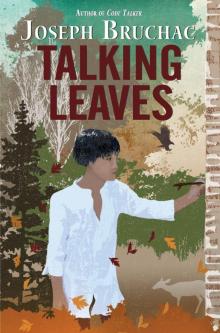 Talking Leaves
Talking Leaves Found
Found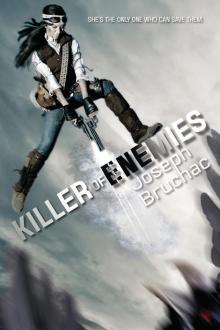 Killer of Enemies
Killer of Enemies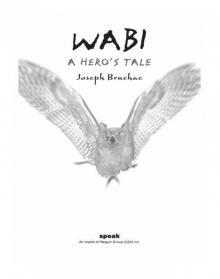 Wabi
Wabi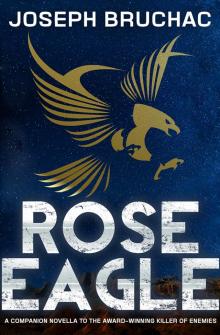 Rose Eagle
Rose Eagle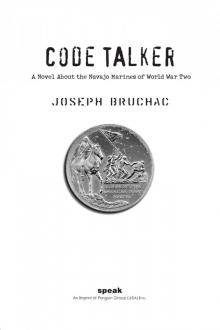 Code Talker
Code Talker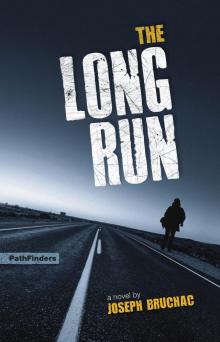 The Long Run
The Long Run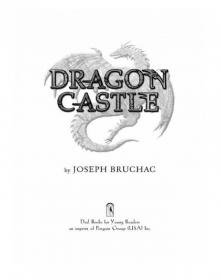 Dragon Castle
Dragon Castle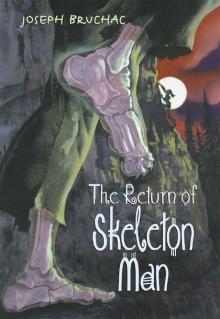 The Return of Skeleton Man
The Return of Skeleton Man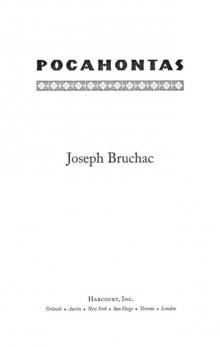 Pocahontas
Pocahontas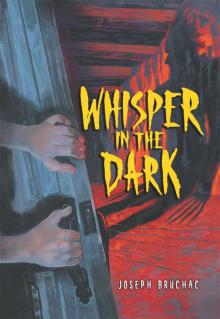 Whisper in the Dark
Whisper in the Dark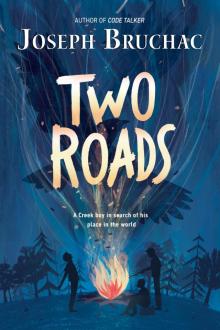 Two Roads
Two Roads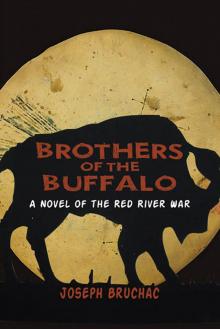 Brothers of the Buffalo
Brothers of the Buffalo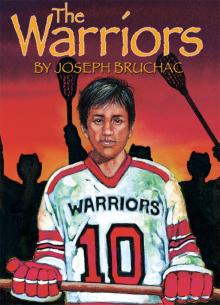 The Warriors
The Warriors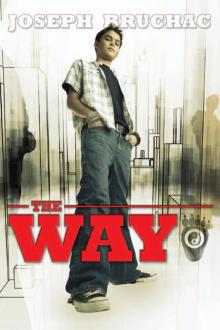 The Way
The Way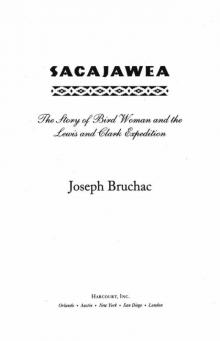 Sacajawea
Sacajawea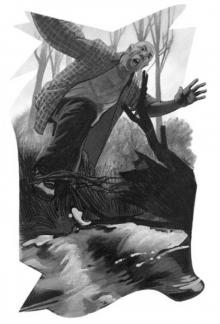 Night Wings
Night Wings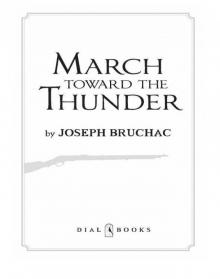 March Toward the Thunder
March Toward the Thunder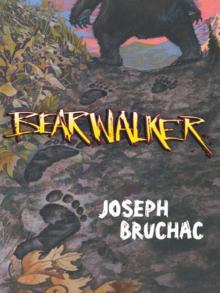 Bearwalker
Bearwalker Skeleton Man
Skeleton Man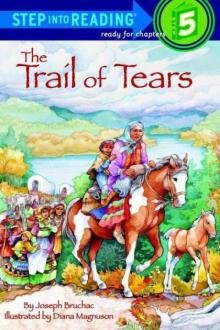 The Trail of Tears
The Trail of Tears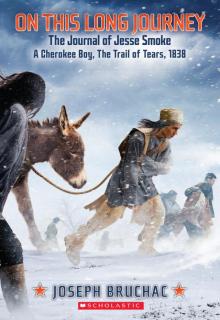 On This Long Journey
On This Long Journey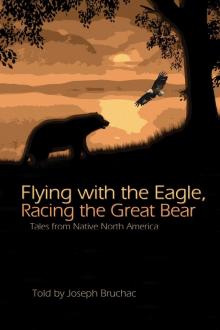 Flying with the Eagle, Racing the Great Bear
Flying with the Eagle, Racing the Great Bear